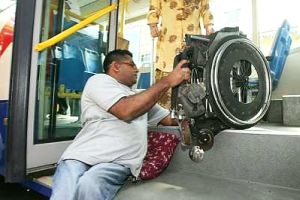Shahrizat: Cater to the needs of the disabled
PETALING JAYA: Women, Family and Community Development Minister Datuk Seri Shahrizat Abdul Jalil has called for a “barrier-free” environment to cater to the needs of the disabled community.
She said the ministry would rigorously defend the rights of the disabled.
“The requests for more disabled-friendly public transport facilities should not be taken lightly,” she said in a statement.
“All authorities involved in the handling and provision of, among other things, public transport, recreational parks and buildings must take into account the needs of all members of society, including the disabled.
“It is time that a ‘barrier-free’ environment be realised for the benefit of the whole of society.”
Shahrizat added that the ministry held talks with the Housing and Local Government Ministry in July to discuss the efforts taken to provide access and mobility for the disabled.
She added that a joint working paper between the two ministries was submitted during the national council meeting for local government, chaired by the Prime Minister, on Sept 25.
Category: News
The Star – December 04, 2006: Disabled face daily barriers
KUALA LUMPUR: “We want disabled-friendly vehicle, We cannot get into buses, We want barrier-free and accessible buses.” Scrawled on placards, these plaintive pleas represented some of the daily obstacles faced by wheelchair-bound people in getting around in public.
Led by Damai Disabled Persons Association of Selangor and Wilayah Persekutuan, the group of disabled people gathered at the KL Sentral bus stop, lobbying for facilities that are more sensitive to their needs.
Besides demanding disabled-friendly buses, they also wanted disabled-friendly infrastructure such as wheelchair ramps at bus stops.
NO RAMP: V. Puspanathan, 30, demonstrating the difficulty of getting out of a bus by dragging himself down the steps while struggling with his wheelchair.
The association’s president V. Murugeswaran said buses were one of the most important modes of public transport for the disabled, as most of them did not own a car and taxis were too expensive.
He said they were disappointed with the public bus operator, RapidKL, which had failed to fulfil its promise to provide 100 disabled-friendly buses.
“RapidKL bought new buses in September but we have yet to see one that is disabled-friendly,” Murugeswaran told reporters in conjunction with the International Day of Disabled Persons.
“Without public transport, we lose out on a lot of opportunities such as jobs and education.
“At this celebration, we want to show decision makers our daily obstacles but we do not want charity, we want to be independent,” he said.
Barrier-free Environment and Accessible Transport Group (BEAT) coordinator Christine Lee said they had sent a memorandum to RapidKL to explain the needs of the disabled.
“Statistics have shown that the number of disabled people is rising due to accidents and old age.
“Disabled-friendly facilities are accessible and safe for wheelchair-bound people, the elderly, young children as well as pregnant women,” she said.
When contacted, RapidKL corporate communications division senior manager Katherine Chew said the 100 units of disabled-friendly buses would be delivered in batches from Europe soon.
“We hope they will arrive by January,” she said.
She also urged the disabled community to be patient, as changes could not be made overnight.
Malaysiakini – December 1, 2006: Have at least basic accessibility for the disabled
Have at least basic accessibility for the disabled
Abdul Karim Stuart Russell
Dec 1, 06 4:25pm Adjust font size:United Nation’s International Day of Disabled Persons (IDDP), on Sunday Dec 3, is a wonderful opportunity to promote understanding and increase awareness in Malaysia of disability issues, and promulgate the importance of independence, ease of movement, integration, dignity, equal rights and the well-being of persons with disabilities of all kinds.
With good education, full accessibility to facilities such as buildings and public transport; proper training and understanding employers, persons with disabilities can be an asset to the nation and should be integrated into, and participate in, every facet of social, economic, political and cultural life in Malaysia.
The serious deficiencies of our public transport systems hamper the independence, equal rights, dignity and well-being of all persons with disabilities. These deficits must be rectified because they are fundamental prerequisites to integration and independence.
The disabled are discriminated against and Malaysians with disabilities – even in Kuala Lumpur – are excluded from almost all public transport.
Taxi drivers charge wheelchair users an additional RM10 to carry a wheelchair while the blind get taken on a roundabout route so that the taxi meter clocks up a higher fee. Some airlines charge an extra fee to use a wheelchair, and even claim the right to refuse to carry the disabled.
Authorities do not provide properly designed footpaths, road crossings, do not adhere to universal standards regarding the head clearance for signs, for the placement of street furniture, the provision of wheelchair ramps, etc.
Consequently people with disabilities in Malaysia cannot safely make their own way around the locality where they live or venture further afield to reach a car park or public transport system.
E-Accessibility is the theme for IDDP 2006 but here in Malaysia, if the disabled simply have basic accessibility, they will be genuinely delighted and the nation will be one step closer to eventually being a developed country.
The writer is spokesperson for Action and Inclusion for the Disabled (Aid).

